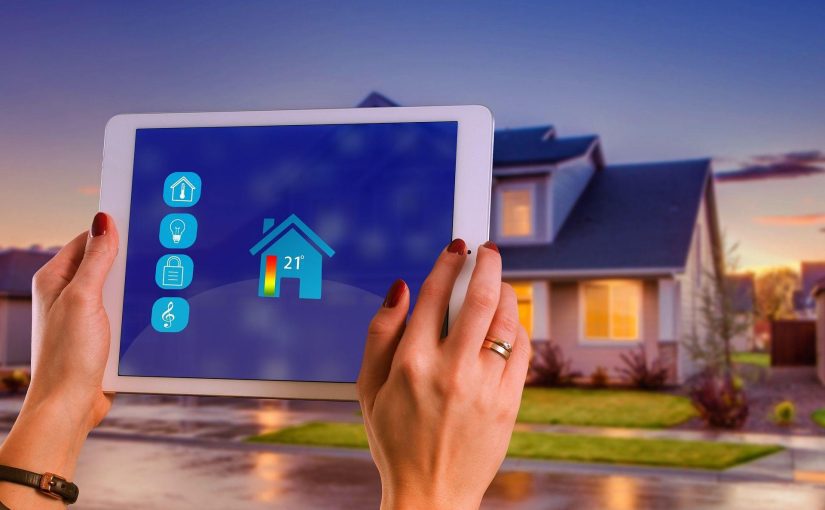
Smart home technology has come a long way from motion-triggered lights and voice-controlled thermostats. Today’s systems are entering a new phase – where automation evolves into anticipation. The modern smart home doesn’t just react; it thinks ahead, learning from your behavior to create seamless, personalized experiences.
The big shift? Moving beyond basic rule-based automation to proactive intelligence. Users don’t want to manage a dozen devices manually throughout the day – they expect their home to understand them. That means lights dim automatically when it’s time to wind down, air quality adjusts after cooking, and heating aligns with individual room usage patterns – all without lifting a finger.
Behind the scenes, this sophistication requires advanced AI that brings together data from motion detectors, temperature sensors, microphones, cameras, and user apps. These systems learn complex patterns – like weekday routines, weekend habits, or seasonal preferences – and make real-time decisions that juggle comfort, energy efficiency, and safety.
Example: A smart HVAC system might detect that you’ve left for work early, note that outdoor temperatures are dropping, and preemptively warm the house just before you return – cutting energy costs while keeping comfort high.
This new era of AI-driven smart living isn’t about flashy gadgets – it’s about removing friction from daily life, helping people feel safer, more comfortable, and more in control without constant interaction.
Smart Thermostats & Climate Devices
Climate control represents one of the most impactful applications of AI in smart homes, where intelligent systems can significantly reduce energy consumption while improving comfort levels. Modern smart thermostats have evolved far beyond programmable schedules to become sophisticated environmental management systems.

Must-Have Features:
- Occupancy-Based Learning – Efficient Use of Heating and Cooling
Modern systems do more than track whether someone is home – they learn how different spaces are used. By combining inputs from motion sensors, smartphone GPS, calendar events, and historical usage, the thermostat can tell when the kitchen gets busy on weekday afternoons or when the living room is the center of activity in the evenings. It then adjusts temperatures in real time, avoiding energy waste in unused zones – potentially cutting HVAC consumption by 25–30%.
- Weather Prediction Integration – Smart, Forecast-Driven Climate Control
AI-enhanced climate control taps into local weather forecasts and your home’s thermal behavior. Instead of reacting after a heatwave hits, the system might start cooling in advance or hold off on heating if solar warmth is expected. This proactive conditioning reduces energy peaks and keeps utility costs in check – all while maintaining comfort.
- Multi-Zone Coordination – Even Comfort Across All Rooms
For homes with multiple heating/cooling zones or complex layouts, managing airflow efficiently can be tricky. AI systems learn how quickly different rooms heat or cool, how air moves between them, and how best to balance vents and systems. The result? No more hot bedrooms and freezing hallways – just even, efficient comfort.
Advanced Features:
- Seasonal Adaptation Intelligence – Energy Savings and Year-Round Comfort
Over time, the system learns your body’s seasonal rhythms – like how your comfort tolerance shifts between winter and summer – and fine-tunes settings to match. This gradual adjustment can cut HVAC costs by 15–20% annually, without you ever noticing a change in comfort.
- Health-Focused Environmental Control – Better Air Quality and Wellness
These systems go beyond temperature. They monitor indoor air quality, humidity, and even CO₂ levels to support sleep quality, reduce allergens, and align with circadian rhythms. Whether it’s boosting ventilation during cooking or moderating humidity during allergy season, your thermostat becomes part of your wellness routine.
- Predictive Maintenance Monitoring – Avoiding Unexpected Breakdowns
AI continuously tracks HVAC performance – measuring efficiency, cycling behavior, and temperature trends – to spot issues before they cause breakdowns. Think of it as a built-in technician that schedules maintenance before things go wrong, extending equipment lifespan and avoiding surprise repair bills.
Smart Lighting Systems
Intelligent lighting has evolved from simple dimming and scheduling to sophisticated systems that support circadian health, enhance security, and create dynamic environments that adapt to activities and moods throughout the day.
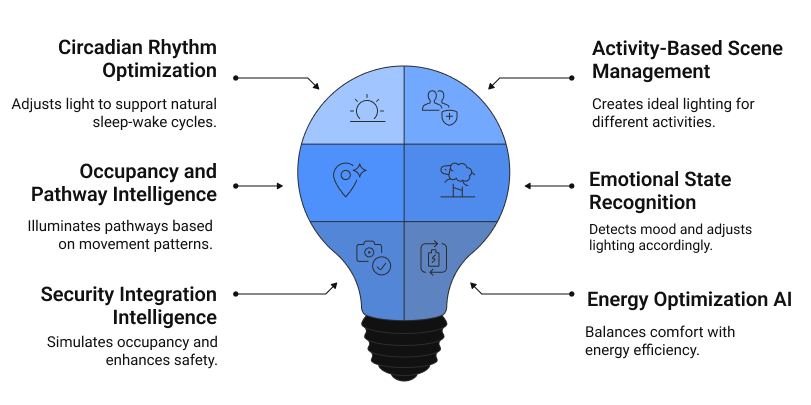
Must-Have Features:
- Circadian Rhythm Optimization – Supporting Natural Sleep-Wake Cycles
The system automatically adjusts color temperature and brightness throughout the day – from warm, dim light in the morning to bright, cool light during peak hours, then back to warm tones in the evening. This isn’t just about comfort: research shows proper circadian lighting can improve sleep quality by 23% and boost daytime alertness significantly.
- Activity-Based Scene Management – Lighting Tailored to Your Daily Tasks
By recognizing different activities, the system creates ideal lighting environments automatically. It learns that working on a laptop needs bright, focused light, cooking requires task illumination, dining calls for ambient warmth, and entertainment benefits from bias lighting behind screens.
- Occupancy and Pathway Intelligence – Lighting That Follows You Naturally
Instead of simple motion detection, this AI learns your typical movement patterns and illuminates pathways before you arrive. It also ensures lights turn off promptly when rooms are truly empty – saving energy without sacrificing convenience.
Advanced Features:
- Emotional State Recognition – Lighting That Matches Your Mood
By analyzing lighting preferences and environmental factors, the system detects your energy levels and mood. It can brighten rooms during low-energy periods or shift to calming warm tones when stress is sensed – helping create supportive environments throughout the day.
- Security Integration Intelligence – Realistic Occupancy Simulation and Safety
This feature works with security systems to vary lighting patterns during absences, making your home appear occupied and deterring intruders. It also automatically lights escape routes and entry points during security alerts.
- Energy Optimization AI – Balancing Comfort with Efficiency
The system learns when full illumination is truly needed versus when lower light levels suffice. Considering natural light, task demands, and user sensitivity, it delivers the minimum lighting required to maintain comfort and functionality – reducing energy use without compromising quality.
Smart Security & Cameras
AI has revolutionized home security by enabling systems that can distinguish between genuine threats and false alarms while providing intelligent monitoring that adapts to household routines and behavioral patterns.
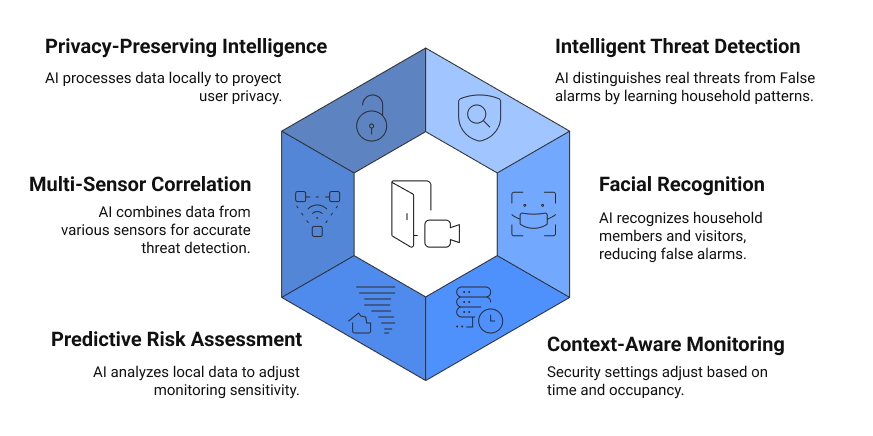
Must-Have Features:
- Intelligent Threat Detection – Spotting Real Risks, Not False Alarms
Going beyond simple motion sensors, AI learns typical patterns like package deliveries, family arrivals, and pet movements. It then flags unusual or suspicious behavior – such as furtive movements or forced entry attempts – helping reduce false alerts and increase security accuracy.
- Facial Recognition and Behavioral Analysis – Detecting Unusual Activity
The system recognizes household members, regular visitors, and service personnel while spotting unknown individuals. It learns routines – like the mail carrier’s schedule or when teenagers come home late – reducing false alarms while maintaining vigilance.
- Context-Aware Monitoring – Dynamic Sensitivity Based on Time and Occupancy
Security settings automatically adjust to time of day and whether the home is occupied. For example, detection sensitivity increases during work hours when the house is empty and relaxes in the evening during family activity, minimizing unnecessary alerts.
Advanced Features:
- Predictive Risk Assessment – for Proactive Security Based on Local Factors
AI analyzes neighborhood crime data, local events, and environmental conditions to adjust monitoring sensitivity. It can heighten alertness during holidays, emergencies, or periods of increased local risk, keeping your home safer when it matters most.
- Multi-Sensor Correlation – Comprehensive Situational Awareness
By combining data from cameras, door and window sensors, glass break detectors, and environmental monitors, the system accurately distinguishes between harmless events – like a pet triggering motion – and real threats, such as a window being forced open.
- Privacy-Preserving Intelligence – Smart Security Without Compromising Privacy
AI processes video locally to protect your privacy, enabling intelligent alerts without storing identifiable images or sending personal data to the cloud. This ensures robust security while respecting user confidentiality.
Smart Appliances
Kitchen and laundry appliances represent a growing category where AI creates value through predictive maintenance, usage optimization, and integration with household routines and dietary management.
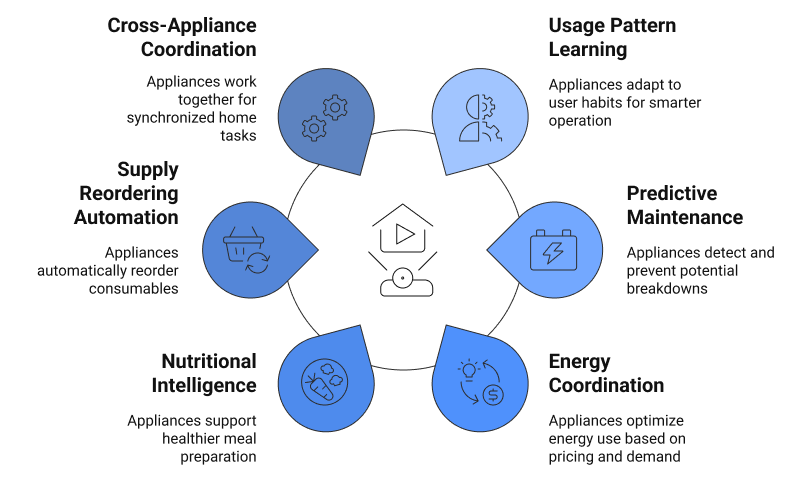
Must-Have Features:
- Usage Pattern Learning – for Smarter Daily Operation
Instead of relying on default settings, smart appliances adapt to how they’re actually used. An oven might automatically preheat on Sunday afternoons when it learns your baking routine, while a washer adjusts cycles based on fabric type and load history.
- Predictive Maintenance – to Prevent Breakdowns Before They Happen
Appliances monitor their own performance – tracking indicators like vibration in washers, energy spikes in dryers, or temperature drift in fridges – to detect early signs of failure and schedule service before issues escalate.
- Energy Coordination – to Lower Bills and Optimize Timing
AI balances appliance use with energy pricing and household demand. It may delay a dishwasher cycle until solar output peaks or stagger appliance operation to avoid energy surges, reducing costs without sacrificing convenience.
Advanced Features:
- Nutritional Intelligence – Healthier, Smarter Meal Prep
Kitchen devices go beyond cooking – they support your diet. Refrigerators track ingredient freshness, ovens adjust for healthier cooking methods, and the system can suggest recipes based on available items and nutritional preferences.
- Supply Reordering Automation – Never-Run-Out Convenience
Appliances track usage rates and automatically reorder consumables like detergent, filters, or water softener salt. The system adjusts for seasonal use and can coordinate restocking across multiple devices.
- Cross-Appliance Coordination – for a More Synchronized Home
AI enables appliances to work together. Your dryer might wait until the HVAC system is idle to reduce humidity buildup, or kitchen appliances may time multiple dishes for a meal that finishes simultaneously.
Smart Irrigation & Outdoor Systems
Outdoor smart systems represent an often-overlooked category where AI can create significant value through water conservation, plant health optimization, and integration with weather and environmental data.
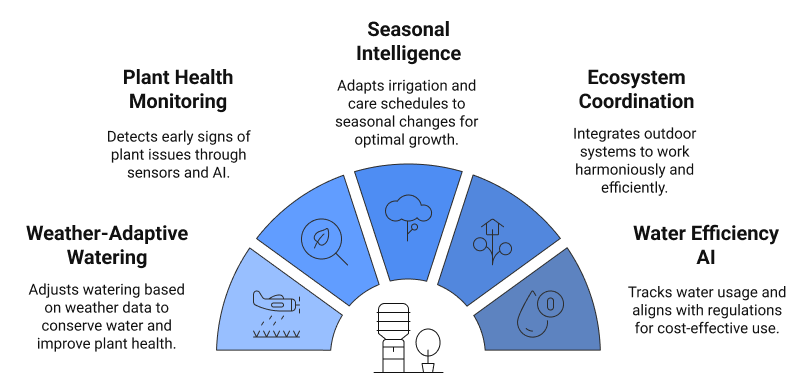
Must-Have Features:
- Weather-Adaptive Watering – for Healthier Plants and Less Waste
By combining local weather forecasts, real-time rainfall, soil moisture data, and plant-specific needs, smart irrigation systems fine-tune watering schedules. This precision can reduce water use by 30–50%, while also preventing overwatering and improving plant vitality.
- Plant Health Monitoring – to Catch Problems Early
Through sensors and AI-driven image analysis, the system detects early signs of disease, dehydration, or pest activity. It can adjust watering zones to support recovery, suggest treatments, and notify homeowners before minor issues become expensive problems.
- Seasonal Intelligence – for Year-Round Garden Optimization
The system learns how each plant responds to seasonal changes and automatically adjusts irrigation and care schedules. From spring bloom to late autumn maintenance, it tailors outdoor routines for optimal growth and resilience.
Advanced Features:
- Ecosystem Coordination – Smarter Outdoor Automation
Outdoor systems work together, not in isolation. Irrigation may pause when motion-triggered lights or security cameras are active, or coordinate with landscape lighting to avoid fixture damage. It creates a harmonious, low-maintenance environment that responds intelligently to multiple inputs.
- Water Efficiency AI – for Smarter Use in Any Climate
The system tracks water usage patterns, utility costs, and local watering regulations. It can shift schedules to align with lower-cost periods, auto-comply with restrictions, and prioritize high-value zones during droughts or limited supply – ensuring responsible and cost-effective usage.
Developex: Your AI Partner for Audio & Smart Home Innovation
The future of smart living seamlessly blends intelligent audio with connected homes, and AI is the key. At Developex, we bring deep expertise in AI/Machine Learning, IoT, NLP, and advanced audio processing to help you innovate across both domains.
We offer end-to-end software development and AI integration services to turn your ideas into intelligent, market-ready products. Here’s how we can help:
- Custom AI & Machine Learning: We develop bespoke AI models for features like adaptive noise cancellation, personalized sound, behavioral learning for climate, and intelligent security detection.
- Seamless Edge & Cloud Integration: We optimize AI to run efficiently both on-device (Edge AI) for real-time responsiveness and in the cloud for data analytics and continuous learning.
- Contextual Understanding: We build algorithms that combine data from all sensors (mics, cameras, environmental) to create a comprehensive understanding of your home’s environment, powering contextual voice assistants and adaptive routines.
- Enhanced User Experience: Our AI solutions focus on unparalleled personalization, from curated audio to smart home routines that anticipate needs, making technology intuitive and delightful.
- Security & Privacy First: We integrate advanced AI for anomaly detection and implement privacy-preserving AI solutions to safeguard user data and ensure system integrity.
- Cross-Device Harmony: We design the software architecture for your audio and smart home devices to communicate and work together seamlessly, enabling unified control and synchronized experiences across your entire product ecosystem.
Partner with Developex to deliver innovative, high-performance intelligent living products that truly stand out in the market.
Final Thoughts: Stepping into a Truly Intelligent Future
The journey of AI in audio and smart home devices is truly exciting. We’re moving beyond simple automation to a future where our homes and gadgets genuinely anticipate our needs, learn from our habits, and create a seamless, intuitive living experience. This isn’t just about convenience; it’s about making our lives richer, more efficient, and more connected in ways we’re only just beginning to imagine.
For companies in this space, the message is clear: AI isn’t optional; it’s foundational. The brands that will lead tomorrow are those investing today in sophisticated, privacy-conscious, and user-centric AI implementations. It’s about building products that aren’t just smart, but truly intelligent – products that become indispensable partners in daily life.
The potential for innovation is immense, from optimizing your energy consumption and enhancing security to curating your perfect environment for work or relaxation. The intelligent home isn’t just a collection of devices; it’s a living, learning ecosystem designed around you.
Are you looking to integrate cutting-edge AI into your next audio or smart home product? Developex has the deep expertise in Smart Home, IoT, and system integration to help you transform your vision into reality.
Let’s build something truly intelligent together. Get in touch with us to learn more about our AI & smart home development services.






